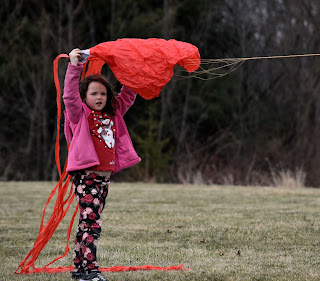Sure signs of spring: we've been blowing bubbles and transplanting bulbs and getting ready for the youngest grandkid's first birthday party, and today, between a gray damp morning and a rainy evening, we found a perfect moment to fly the big red octopus kite. Gusty breezes blew it around in the sky and sometimes sent it dashing to the ground, while the kids ran and jumped and tried to catch it. The youngest was a little scared when the kite came too close, but a red-tailed hawk overhead did not seem at all alarmed.
Watching the kite and the bird and all that rambunctious energy soothed my soul and opened a door for joy. Worms gotta squirm and kites gotta fly and when the time is right, you can't stop spring from moving right in.
 |
| Discovering snowdrops |
 |
| Squirmy, wormy, goose. |



























